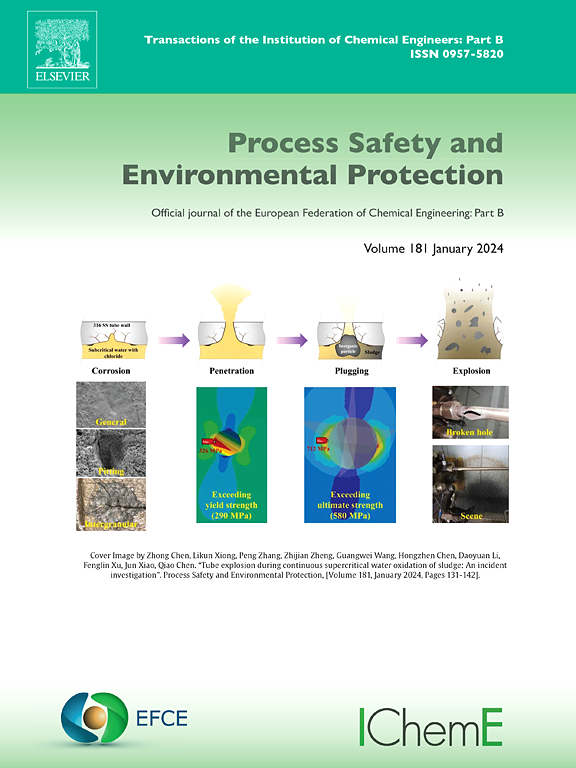用深共晶溶剂在温和温度下从废锂离子电池中高效回收有价金属
IF 6.9
2区 环境科学与生态学
Q1 ENGINEERING, CHEMICAL
引用次数: 0
摘要
废旧锂离子电池中锂、钴、锰等战略性金属含量高,具有相当的回收利用价值,因此对废旧锂离子电池的回收利用具有重要意义。本研究合成了一种高效、环保的深共晶溶剂——氯化胆碱-柠檬酸,并将其应用于废锂电池正极材料中有价金属的回收。实验结果表明,在浸出时间60 min、浸出温度80℃、氯化胆碱与柠檬酸摩尔比2:1的条件下,Co、Li的浸出率分别为94.26 %和96.98 %。此外,我们通过浸出动力学深入分析了DES的浸出机理,发现Co和Li两种有价金属的浸出反应受扩散和混合表面化学反应控制。两种金属的活化能分别为16.60 kJ·mol−1和15.48 kJ·mol−1。机理分析结果证实,Li优先被浸出,DES与过渡金属形成配合物,降低金属价态,促进金属浸出。本文章由计算机程序翻译,如有差异,请以英文原文为准。
Efficient recovery of valuable metals from spent lithium-ion batteries bydeep eutectic solvents at mild temperature
The recycling of spent lithium-ion batteries (LIB) is of great significance due to their high content of strategic metals such as lithium, cobalt, and manganese, which possess considerable recycling value. In this study, a high-efficiency, eco-friendly deep eutectic solvent (DES), choline chloride-citric acid, was synthesized and applied to recycling valuable metals from the cathode materials of spent LIB. The experimental results showed that recycling of Co、Li can be achieved under optimal conditions: leaching time 60 min, leaching temperature 80 °C, choline chloride: citric acid molar ratio 2:1, the leaching efficiencies of 94.26 % for Co and 96.98 % for Li. Moreover, we deeply analyzed the leaching mechanism of DES by leaching kinetics, it was found that the leaching reactions of two valuable metals, Co and Li, are controlled by diffusion and mixed surface chemical reactions. The activation energies of the two valuable metals were determined to be 16.60 kJ·mol−1 and 15.48 kJ·mol−1, respectively. Mechanism analysis results confirm that Li was leached preferentially, and DES forms complexes with transition metals, reducing the metal valence state and promoting metal leaching.
求助全文
通过发布文献求助,成功后即可免费获取论文全文。
去求助
来源期刊

Process Safety and Environmental Protection
环境科学-工程:化工
CiteScore
11.40
自引率
15.40%
发文量
929
审稿时长
8.0 months
期刊介绍:
The Process Safety and Environmental Protection (PSEP) journal is a leading international publication that focuses on the publication of high-quality, original research papers in the field of engineering, specifically those related to the safety of industrial processes and environmental protection. The journal encourages submissions that present new developments in safety and environmental aspects, particularly those that show how research findings can be applied in process engineering design and practice.
PSEP is particularly interested in research that brings fresh perspectives to established engineering principles, identifies unsolved problems, or suggests directions for future research. The journal also values contributions that push the boundaries of traditional engineering and welcomes multidisciplinary papers.
PSEP's articles are abstracted and indexed by a range of databases and services, which helps to ensure that the journal's research is accessible and recognized in the academic and professional communities. These databases include ANTE, Chemical Abstracts, Chemical Hazards in Industry, Current Contents, Elsevier Engineering Information database, Pascal Francis, Web of Science, Scopus, Engineering Information Database EnCompass LIT (Elsevier), and INSPEC. This wide coverage facilitates the dissemination of the journal's content to a global audience interested in process safety and environmental engineering.
 求助内容:
求助内容: 应助结果提醒方式:
应助结果提醒方式:


